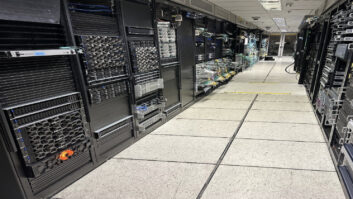Microsoft TV’s UK Business Manager Gavin McLaughlin has challenged a basic tenet of the emerging IPTV (internet protocol TV) market in saying “triple play is the wrong goal” at the recent IPTV World Forum in London, writes Richard Dean — “seamless single play should be the end game,” he said.
McLaughlin wants to see the three functions touted for the new breed of telecoms-connected services – namely video on demand (VOD) television, internet access and voice over IP (VoIP) telephone – fully integrated on a more sophisticated TV set user interface.
Predicting 20m European IPTV users by year 2008, McLaughlin said that viewers will see incoming calls flagged on the screen alongside the caller’s number, correlated name or picture, and be offered the choice of accepting the call, pausing picture while answering, or declining the call.
Viewers will also be able to add remote home surveillance, access ‘personalised TV’ streams of a daughter’s first steps at a dancing class for instance, and even communicate between sets in the home. Internet access will be an integral part of the viewing experience, with the possibility to synchronise web page information with programming, added McLaughlin.
Microsoft is supplying the Alcatel co-developed platform to BT for its UK launch of IPTV late this Summer, which will reportedly use Philips set top boxes (STB) with built-in 80-hour PVR disk storage and a Freeview tuner. Content providers signed up so far include BBC Worldwide, Paramount and Warner Music Group, HIT Entertainment and the National Geographic Channel.
Ivan Verbessett of ANT Software agreed to the extent that industry must avoid what he described as “a digital mess of incompatible, unrelated devices.” Danny Wilson of Pixelmetrix, who chaired the ‘Content and the future for IPTV’ session at the lively conference, pointed out that IPTV differs from conventional cable and satellite in that it is interactive, and the switching is done in the network – both of which promise viewers the lure of a more immersive and integrated experience once the faster ADSL2+ (asymmetrical digital subscriber line) broadband infrastructure is rolled out across unbundled ‘last mile’ connections to telecoms networks.
Yet more alluring is the chance to integrate what Wilson delights in calling ‘four play’ – more commonly known as quad play – where operators add wireless access to their triple-play package. “Today’s TV set is an isolated island of technology, like the PC of the 1980s, and it’s about to get connected,” concluded McLaughlin, adding that it is now hard to imagine a PC without the internet. “IPTV will be way different from anything consumers have seen before. Software will be the magic sauce to make TV better.” For a full report see the April edition of TVB-Europe.







